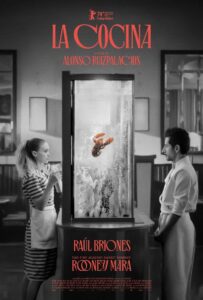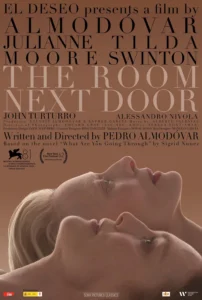I look forward to the Philadelphia Film Festival every year. I choose the foreign language films carefully, particularly the ones in Spanish, because I can be two hours in Madrid, Mexico or Latin America somewhere, listening to my own language. I can get lost in new colloquial expressions or admire new actors and directors I didn’t know yet. Well, not so much anymore. It seems that the Lingua Franca for many films, no matter the country of origin, is English.
 Take Daniela Forever, a romantic science fiction drama directed by Nacho Vigalondo. Not only is it in English, but the few shots of Madrid look like postcards and its protagonists are Henry Golding (a Malaysian born British actor) and Beatrice Grannò (an Italian actress). Turns out that the description in the catalog states the countries of origin as Spain and Belgium. When I taught film at Saint Joseph’s University, I used the term “Euro pudding” for productions like this one from several European countries.
Take Daniela Forever, a romantic science fiction drama directed by Nacho Vigalondo. Not only is it in English, but the few shots of Madrid look like postcards and its protagonists are Henry Golding (a Malaysian born British actor) and Beatrice Grannò (an Italian actress). Turns out that the description in the catalog states the countries of origin as Spain and Belgium. When I taught film at Saint Joseph’s University, I used the term “Euro pudding” for productions like this one from several European countries.
La Cocina, from Mexico and USA directed by Alonso Ruizpalacios, takes place in Manhattan. The actors are mainly Mexican (Raúl Briones Carmona and Anna Díaz, for example), with the exception of Rooney Mara playing the “Gringa” in this comedy reminiscent of The Bear (the American TV series). Most of the Spanish spoken consist of profanity. Shot in black and white to portray the sordidness of the kitchen workers’ life, it is a sad immigration story, despite the “comedy” of its description.
Pedro Almodóvar’s latest film, The Room Next Door, has been advertised as his first full-length in English. No surprise here, although there is a specific reason for this, as we soon see. It takes place in New York City and Woodstock, NY, with the spectacular cast of Julianne Moore as Ingrid, Tilda Swinton as Martha and her daughter, and a minor role by John Turturro as Damian. This film has many of Almodóvar’s traits, such as the vibrant colors, particularly reds (the lipstick shades, the Volvo, the walls, the pillows, the sweaters worn by Ingrid, her large travel bag); the light-filled interiors: Martha’s apartment with the huge flowered wall paper and, in particular the house in the woods, filmed outside Madrid in the pine forest of San Lorenzo de El Escorial; and less we forget the ever-present, captivating music by Alberto Iglesias.
The Room Next Door (La habitación de al lado in Spanish) is based on the novel What Are You Going Through (2020) by Sigrid Nunez. It premiered at the 81st Venice International Film Festival, where it won the top prize, the Golden Lion, a first for a Spanish film. It will be widely released in the United States on December 20th, 2024. Don’t miss it!
 It is not the first time that Almodóvar has developed socio-political themes in his films with his emphasis on gender issues and sexuality. Some critics see The Room Next Door as a continuation of Pain and Glory (Dolor y gloria, 2019) for its existential themes of illness and death. I believe that Almodóvar chose English in his latest film and set it in the United States, to emphasize the difference between Spain and the United States with relation to euthanasia.
It is not the first time that Almodóvar has developed socio-political themes in his films with his emphasis on gender issues and sexuality. Some critics see The Room Next Door as a continuation of Pain and Glory (Dolor y gloria, 2019) for its existential themes of illness and death. I believe that Almodóvar chose English in his latest film and set it in the United States, to emphasize the difference between Spain and the United States with relation to euthanasia.
Euthanasia has been legal in Spain since 2021, the fourth country in Europe and the sixth in the world to allow it. While Euthanasia is still illegal in the United States, only ten states and the District of Columbia allow assisted suicide. The irony and dark humor of the last sequences between the small-town police and Ingrid in The Room Next Door speak volumes in any language. The use of the English language is as crucial a component as a mature Almodóvar has ever brought to the large screen. A Lingua Franca, indeed.

Me ha gustado muchísimo tu análisis, querida Concha.
Besos, Ángeles
Gracias, Ángeles. Me encantó la de Almodóvar. ¿La has visto?
Besos, Concha
This makes me so eager to go back to the movies! Jean
The best thing to forget about everything else! Concha
Gracias Concha! A ver si tendré tiempo para ir al cine. Me gustaría ver la de Almodóvar.
Cécile
Es estupenda. Me encantó, Concha